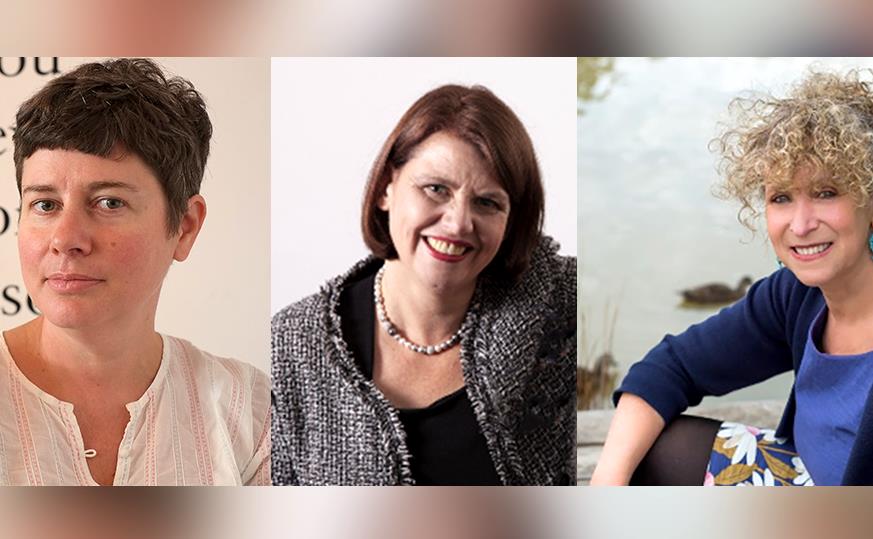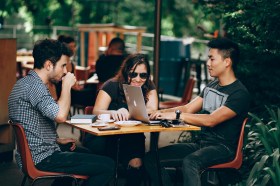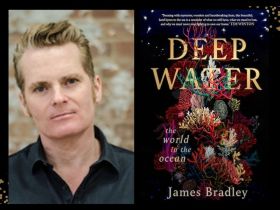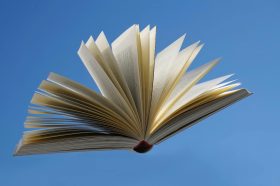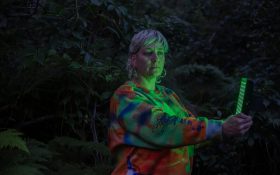Australians are living through a tough year. It began as bushfires highlighted the need to take urgent action on climate change before COVID-19 kicked in – the once in a lifetime pandemic that has amplified systemic inequities within our society, including Black Lives Matter and Indigenous deaths in custody. How then do writers depict this unprecedented time?
Some meet it with hope, honesty and new ideas in two new timely books – Animals Make Us Human (November 2020) edited by Leah Kaminsky and Meg Keneally, and Fire Flood Plague edited by Sophie Cunningham (December 2020). Coming with very different approaches, both gift us precious optimism when we may feel all hope is lost.
The book as time capsule
Fire Flood Plague is a time capsule in book form. Editor Sophie Cunningham believes many of the writers – including John Birmingham, Melissa Lucashenko, Omar Sakr and Brenda Walker – were confronting the time we live in even as it was unfolding.
Cunningham told ArtsHub, ‘This is my personal view, but I think a lot of writers through their essays said that there is only hope if we engage with our reality, rather than deny it. And then we can start to talk and think about ways we can move forward.’
Cunningham sees the book as allowing writers to document what is currently happening around us. ‘I actually learned a lot by talking to the people that were included in the book,’ Cunningham said. ‘There’s some really great thinkers and great writers.’
With contributions from some of Australia’s powerful voices and thinkers, Fire Flood Plague asks writers, scientists, journalists and historians, to express what 2020 has meant to them – even though the world was changing as they wrote.
Read: When fiction and life collide
‘While these issues are always issues we’ve had to write about, the fact that they were going to become a significant part of 2020 was not even clear to us. And one of the things that all the writers had to respond to was how quickly things were unfolding,’ Cunningham continued.
‘So some people revise pieces, some decided to let them sit as time capsules, you know, it was kind of amazing watching writers respond really well and try and engage as things were unfolding – it was quite a challenge,’ she said.
Cunningham’s own entry in the anthology, ‘Dead Water’ is journalistic, taking on the theft of water from the Murray Darling Basin, reminding us of the dead fish in the waterways and the impact of floods.
‘…there is only hope if we engage with our reality, rather than deny it.’
– Sophie Cunningham
Suiting the way the year has been evolving, each essay has been gradually published in The Guardian. Many of the writers are emotionally vulnerable, such as thriller writer John Birmingham who reflects on Hong Kong’s uprising amid the pandemic and his own fears. Birmingham writes, ‘But a funny thing happened on the way to the apocalypse, and that congenital flaw of the human heart and mind, our inability to connect intimate subject to distant object, would be undone.’
Birmingham observes the global links in the strangest years along with the slippery nature of time in 2020. He writes, ‘I had assumed a thousand years ago in February that a world with its own sorrows to attend to would eventually tire of ours [Australia’s], even while the bush burned and the reef turned white and died.’
Appreciating our animals
Bushfires and their impact on the natural world sparked the Australian authors Leah Kaminsky and Meg Keneally into action. Wanting to help in any way they could, the pair teamed up to produce Animals Make Us Human, a collection of responses to Australia’s unique native wildlife.
A who’s who of Australian writing have been paired with animals to write tributes: James Bradley praises the much-maligned magpie, Graeme Simsion digs into wombats and historian Claire Wright takes on possums. The book includes photography chronicling the animals to fully celebrate the natural world.
Kaminsky and Keneally write in the introduction that the events of 2020 were just the ‘latest in a string of insults to the environment that supports our wildlife,’ including the warming waters and loss of habitat. Far from seeing the fires and pandemics as death sentences the editors see them as a point of change.
The introduction continues, ‘The fires were a call to action, underscoring the fragility of our precious ecosystems and what is at risk of being lost. We pulled this book together during the pandemic isolation period, when people stuck at home longed to be outside again, surrounded by nature. Yet this period also gave many the opportunity to appreciate the nature that surrounds us – birds, beetles and butterflies in our backyards and nature strips – that we tend to overlook in the busyness of our daily lives.’
Just as authors had an online auction to raise money for #AuthorsForFireys, proceeds from sales of Animals Make Us Human will go towards the Australian Marine Conservation Society and the Australian Wildlife Conservancy.
Tim Allard, CEO of Australian Wildlife Conservancy is pleased the project sheds light on the natural world. He said, ‘Our native species are unique, found nowhere else on the planet, making Australia what it is. It is our responsibility to protect them now so we all have stories to tell.’
Editors Kaminsky and Keneally said: ‘We are so grateful for the generosity and passion poured into this project. Both contributors and those working behind the scenes have come together to make this such a wonderful tribute to the wildlife we all cherish.’
Whether these books are elegies to a passing world or calls to action depends on their readership. While both see impassioned writers confronting the problems of 2020, they equally demand that readers make them more than words, calling call for a future that recognises the mistakes of the present.
Fire Flood Plague is available in December. Animals Make Us Human was released in November.
